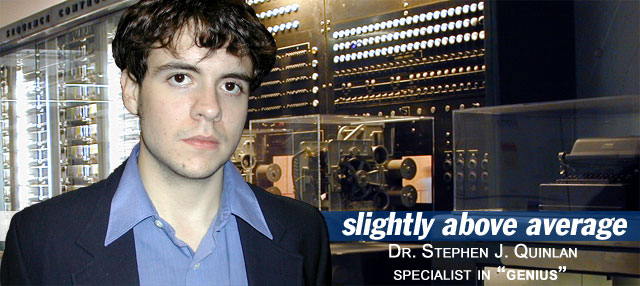by Murad Hussain

The Cult of Murad, 2002
Ah, yes, "The Common Room". "TCR". Where to begin? Well, the name for the show came to me in a dream. I kid you not. I actually had a dream where instead of making love to beautiful women, I was thinking about names for my campus sketch comedy show. Pathetic, isn't it?
Started by Murad Hussain and Mandel Ilagan in September
1996, TCR quickly became one of HRTV's flagship programs, bringing in more
viewers than any other past HRTV production, culminating in the 350-person
audience at the 1997 Demon Pre-Frosh Comedy-Fest. We tape three half-hour
episodes each semester, consisting of, but by no means limited to, such
features as sketch comedy, "man on the street" segments, fake commercials,
guest interviews, mini-movies, and lots of references to crack.
The hierarchy of the show consists only officially of an executive producer (EP), responsible for coordinating all aspects of the show, from pre-production script development and running meetings to scheduling editing time on the AVID machines. However, we found from the very beginning that the EP needs help. Not just professional therapy, mind you, but a production assistant. Thus, having a producer seems to be essential in order for the EP to maintain his sanity and a respectable grade point average. Currently, the position is unofficial, and the exact duties performed can be decided upon between the EP and producer. As a suggestion, though, the producer could, in addition to assisting the EP in general and assuming the EP's duties when he is unavailable, be responsible for, among other things:
- gathering scripts and written material from the rest of the staff,
- reserving rooms (e.g., in Loker) when necessary, and
- signing out equipment.
Additional producers can be appointed by the EP as responsibilities
increase over time with the show's increasing popularity, success, fame,
and phat loot earned from lucrative commercial endorsements.
Finally, the rest of the show's members exist as an army of comedic
soldiers, jacks-of-all-trades, ready both to write AND assist with the
technical side of production. Everyone is also encouraged to act--after all,
we need people on screen, too. Obviously, no one will be
forced to act if they don't wish to, but be warned: being an extra with no
lines is not considered "acting", so you may be pressed into service
should the need arise. However, I doubt you'd be doing comedy if you
weren't secretly hoping that the world knows just how amazing you are, and
let me tell you, the quickest way you can do that is by appearing
onscreen. (Whether your clothes are on at that time is entirely up to
you.)
There should be a weekly show meeting to discuss production and writing issues, be it development, scheduling, whatever. Additional meetings can certainly be called, but frankly, once a week is enough in most situations for everyone to quickly become very sick of each other.

